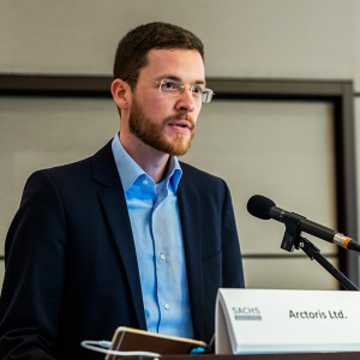Dr Martin-Immanuel Bittner, co-founder and CEO of Arctoris

Martin-Immanuel Bittner is the CEO of Arctoris, the world’s first fully automated drug discovery platform, that he cofounded in Oxford. Arctoris last raised a £3.2m Seed round that enabled the company to build its robotic platform and to fund its geographic expansion to the US and Asia-Pacific, doubling its team. In terms of personal background, Martin graduated as a medical doctor from the University of Freiburg in Germany, followed by his DPhil in Oncology as a Rhodes scholar at the University of Oxford. He has extensive research experience covering both clinical trials and preclinical drug discovery and is an active member of several leading international cancer research organisations, including AACR, EACR, and ESTRO. In recognition of his research achievements, he was elected a member of the Young Academy of the German National Academy of Sciences in 2018.
What is your background? What made you decide to become an entrepreneur?
My background is in medicine: I completed medical school in Germany and started my residency in oncology before coming to Oxford for my DPhil in cancer drug discovery. I was pursuing the clinician-scientist route, and primarily wanted to gain experience in lab research to complement my clinical research work and prepare for a role in translational medical research, i.e. taking new drugs from bench to bedside. At Oxford I was then exposed not only to a world-class scientific environment, but I also met highly driven and motivated people who excelled in so many different ways. Especially at Rhodes House I was fortunate to interact with an amazing cohort of current and senior scholars that helped me to see that there are many ways to have impact, and for a doctor, there are far more options than clinical care and research only. Over the course of my DPhil I learned a lot about what drives me, and that is having a positive, meaningful impact on other people’s lives. I found that for me, entrepreneurship gives me the chance to do that at scale.

Entrepreneurship can take many different shapes. The classic tech entrepreneur, the social entrepreneur, or the professor spinning out a company emanating from a research project. What unites them all is the desire to have real-world impact: a new technology, a new social intervention, a new drug – the entrepreneur sees a need, imagines a solution that doesn’t exist yet, and finds a way to make that solution a reality.
How and when did you know your idea was good enough to develop it?
The first idea for Arctoris evolved through my own experience in the lab, where I could see that my colleagues, highly skilled PhD students and postdocs, were spending most of their time with manual lab work, lacking the time to read the literature, develop hypotheses, write publications etc. It struck me that scientists should be empowered to do what they are best at: original scientific thought, coming up with new ways to think about the world. Knowing that at the same time, all other industries and sectors have been transformed by the rise of robotics and AI, it seemed like the next logical step. That is how the idea behind Arctoris was born over many dinner conversations with two close friends and then cofounders: to build a a robotic laboratory that performs experiments for scientists worldwide at the click of a button. The next step was to develop and verify key assumptions about life sciences processes and the drug discovery ecosystem, the market opportunity, the robotic technology, and the prospects of a company doing what we saw as addressing a real need.
What would you say are the top 3 skills that needed to be a successful entrepreneur? Why?
In my experience, an entrepreneur needs a sense of vision, creativity and resilience. Developing and communicating a vision is what defines an entrepreneur in the first place – seeing something which doesn’t exist yet, and rallying support to make it a reality. Creativity is then required to find ways to overcome the many challenges that lie ahead. And resilience is what keeps an entrepreneur going, and makes him or her pick up the phone to win a client or investor, even after having been told ‘no’ a hundred times that day.
What is your favourite part of being an entrepreneur?
As an entrepreneur, you are a generalist, and you will constantly do things you have never done before. I had to – and still have to – leave my comfort zone over and over again. I very much enjoy being exposed to everything from the science and technology to HR, legal conversations, IP protection, fundraising, marketing, and sales. It is immensely exciting to be challenged and learn something new every single day, and build an idea into a company that serves clients globally.
What individual, company, or organization inspires you most? Why?
I have always been inspired by the stories of scientist-explorers, who set out to learn more about the world and thereby collectively shaped the way we see the world and what we now take for granted. A prime example is German explorer Alexander von Humboldt, who – 200 years ago – in his early thirties travelled to South America and developed what really is the basis for ecology, being the first to describe patterns of flora and fauna as a global instead of a local phenomenon.
If you had 5 minutes with the above individual/ company/organization, what would you want to ask or discuss?
There are so many things to ask! What made him leave the comfort of his home and travel for 5 years? How did he accumulate all the diverse skills necessary to do research on climate, plants, animals, anthropology, geology, and many other fields? How did he combine meticulous planning with the flexibility to deal with situations as and when they arose? There are quite a few parallels to being an entrepreneur…
What would you say have been some of your mistakes, failures, or lessons learned as an entrepreneur?
One of the great things about creating something entirely new is that you’ll do something no one has ever done before. It is natural that this is a learning curve, and numerous things can and will go wrong. I think one of our lessons learned was to find a balance between a reasonable starting point and the encompassing long-term vision. In our case, to first build and perfect a prototype system for key assays, before embarking on scaling our technology to include additional assays and experiments – and now we are conducting a broad range of experiments across cell biology, molecular biology, and biochemistry.
How have you funded your ideas?
When we first developed our idea, we knew we would need external funding to build our company. Given the high technical hurdles involved in our concept of a robotic laboratory, we applied for an Innovate UK R&D grant, which we won in 2017. The work done on the grant generated first strong IP that secured a pre-Seed round in 2018. And only six months later, we were awarded a European Union R&D grant to further develop our automation technologies and expand our operations. Following full technical validation of our robotic technology and demonstration of early product-market fit, we then raised a £3.2M Seed round in mid 2019.
Are there any sector-specific awards/grants/competitions that have helped you?
For companies based in the UK that have a strong focus on R&D, it is definitely advisable to check whether there are suitable grant opportunities, in particular from Innovate UK. Usually at a slightly later stage, the European Union offers very interesting larger grant schemes, but they tend to be even more competitive and often require several collaboration partners across two or more EU member states. For less R&D-focussed businesses at an early stage it can also be very helpful to apply to one of the leading accelerator programmes, such as Entrepreneur First in London and Y Combinator in the Bay area. The first step towards starting and building a company is always the hardest – which is why we launched a competition of our own that promotes bio-entrepreneurship. Emerging biotech companies and entrepreneurial researchers working on novel therapeutics can apply to BioTarget.org, a biotech business competition that runs till October this year. The winners selected by a panel of thought-leaders and industry veterans will be awarded more than $150,000 in free experimentation on our platform.
What is good about being an entrepreneur in Oxfordshire? Bad?
Oxford is an amazing place to start a company, as you can find the most important ingredients: smart and motivated people, and amazing science and technology. At the same time it is close to London as one of the major hubs for finance and investing in the world. This provides for an excellent base of operations. For example, we are always recruiting bright, driven scientists and engineers, and we try to maintain close links with the University’s departments and the local and regional entrepreneurial networks.
If a new entrepreneur or startup came to you looking for entrepreneurship resources, where would you send them?
Over the past few years, the ecosystem in Oxford has evolved massively. There are Oxford Sciences Innovation, Enterprising Oxford, the Foundry, and the new CDL programme that we also took part in These are amazing resources to tap into.
Any last words of advice?
If you see a need, and you think you found a way to address it – don’t stop there. Find out more about the space, get feedback, and if you think you are really onto something, you should try it, and not give up easily. True to Thomas Edison’s approach…
Share this
More news



